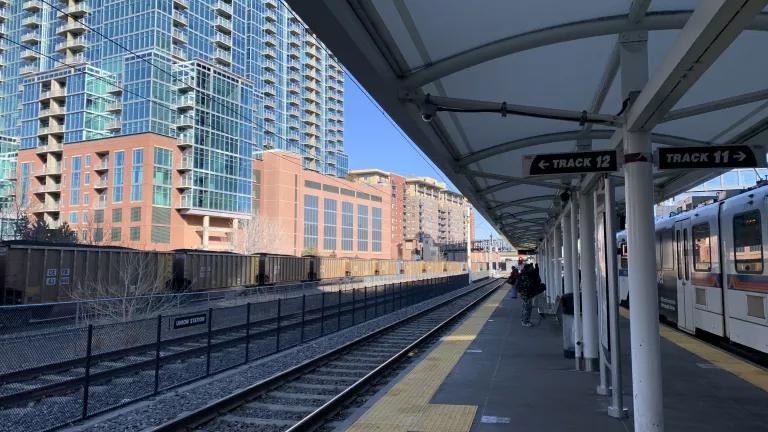Honoring Rosa Parks by Demanding Transit Equity
Rosa Parks took a historic stand for justice by refusing to give up her seat on a bus. Her inspiring vision was a lifelong commitment to the hard work of activism.

For the last 4 years organizers across the country have gathered in cities and towns to call for transit equity. Today marks another Transit Equity Day, and thanks to the Labor Network for Sustainability an array of more than 40 events in 18 states and right here in the Washington, D.C. area are slated for today, with highlights such as this op ed by labor and transit leaders calling for dedicated funding in Pennsylvania and this proclamation by the Governor of Wisconsin.
This is an apt day to organize tactics and events demanding more investment in public transportation service, since it’s the day Rosa Parks was born. Parks took a historic stand for justice by refusing to give up her seat on a bus. And her inspiring vision was much more expansive than that. Hers was also a lifelong commitment to the hard work of activism against injustice.
Integrating that bus wouldn’t mean more equality. Even when there was segregation there was plenty of integration in the South, but it was for the benefit and convenience of the white person, not us….[My aim was] to discontinue all forms of oppression.
Rosa Parks, as quoted in Jeanne Theoharis’ A More Beautiful and Terrible History: The Uses and Misuses of Civil Rights History
Organizing to demand racial justice on her birthday is therefore a fitting tribute.
The timing is also important as we start 2022. Hammered by both pandemic and economic struggles, transit agencies remain a lifeline for bus and rail riders nationwide. This has been especially trying for the many public servants who drive the vehicles that give people access to jobs, communities, education, and health care at this pivotal time.
Which is why partners in the National Campaign for Transit Justice have produced a report called Invest in Transit Equity, Invest in Transit Workers celebrating their service and recommending new policy, practices and investments moving forward. The report collects media coverage of urgent transit service needs in 14 cities nationwide, which is just the tip of the iceberg.
Providing good quality transit service remains a racial justice issue. As the report notes:
“Black people across the country are more likely than white people to count on buses, trains, and other forms of public transit as their primary transportation option, and are more likely to use public transportation to get to work. Investments in public transit thus contribute to economic opportunity for Black and brown working people.
Along with many specific recommendations for improving both service and conditions for transit workers, the report notes more fundamentally that now is the time for agency management dialogues with bus and rail operators themselves, since “[o]perators, maintenance employees, and other transit workers know better than anyone how to improve job quality in order to hire and retain a skilled, stable and professional transit workforce.”
Now is also the time for the U.S. Department of Transportation and state transportation departments to step up. The Infrastructure Investment and Jobs Act (IIJA) enacted almost three months ago contains a historic level of support for public transportation. That funding needs to go out the door expeditiously. And, unfortunately, most of that funding won’t help to meet the day-to-day costs of providing transit service since federal programs are aimed at capital improvements such as buying buses or building rail lines. And that’s where states must step up. The infrastructure legislation authorizes more investment of federal dollars by state transportation departments than any transportation law in history. And as I’ve written about before, the lion’s share of that funding is in programs which Congress has made increasingly flexible over the years. They’re not just for highways anymore. Georgia’s congressional delegation recently sent a letter urging their state DOT to take better advantage of this flexibility to shore up transit service, which is spot-on.
We need to keep the pressure on and keep organizing so this important infrastructure law advances us towards a more just society. Thank you to all the activists honoring Rosa Parks by demanding transit equity today.



